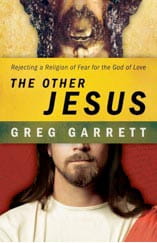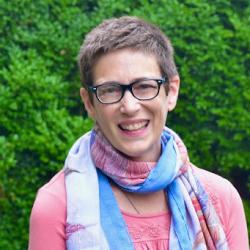 The Other Jesus offers up a theological exploration that will resound with seekers who feel they are ready to give up on religion but are not yet ready to bid farewell to faith. Author Greg Garrett takes us inside his personal journey discovering a Jesus who cares more for love and redemption than law and tradition, and challenges Christians to live lives based on faith in a savior whose primary two-fold commandment was to love God and love others. The Other Jesus asks how Christians would respond to the brokenness of the world if they took this two-fold commandment seriously and lived it out in a kinetic faith as disciples.
The Other Jesus offers up a theological exploration that will resound with seekers who feel they are ready to give up on religion but are not yet ready to bid farewell to faith. Author Greg Garrett takes us inside his personal journey discovering a Jesus who cares more for love and redemption than law and tradition, and challenges Christians to live lives based on faith in a savior whose primary two-fold commandment was to love God and love others. The Other Jesus asks how Christians would respond to the brokenness of the world if they took this two-fold commandment seriously and lived it out in a kinetic faith as disciples.
Along the way, Garrett draws on examples from art, literature, and culture to illustrate the "other faith" that the world is hoping to see from the Church as a whole. It is this kind of faith that saved Garrett's life and inspired him to more deeply pursue the hard questions that face believers and seekers alike. Drawing on his wide religious training and experience, he cites both church tradition and scripture on the path to beginning to understand the "Other Jesus." In doing so, he describes a journey with which many will empathize. Perhaps most importantly, The Other Jesus illuminates the way in which faith is just that—a journey, and one well worth the time it will take to explore and discover.
In this interview, Garrett discusses the writing of the book, his experiences with art, the richness of the Celtic tradition, and more.
 Your other spiritually focused books have been centered on personal memoir and popular culture (U2, superheroes, Hollywood, Harry Potter). What makes The Other Jesus different from these?
Your other spiritually focused books have been centered on personal memoir and popular culture (U2, superheroes, Hollywood, Harry Potter). What makes The Other Jesus different from these?
Those other books do one of two things (and sometimes both, I guess): they talk about cultural subjects in a theological way, or they tell a story about my faith journey. The Other Jesus is a book of theology that was prompted by my faith journey. Over the last decade and a half as I've moved from being a person who couldn't conceive of himself as Christian to a person who spent three years training for the priesthood, I've had a ton of engagement with Church traditions, ministry professionals, and laypersons, with the Emerging Church conversation (a couple of whose godfathers and midwives are my friends), with formal study, and with my ongoing vocation as someone now called to think about faith and practice publicly.
As is appropriate for a theological work that began as personal wrestling, what I'm trying to do in The Other Jesus is to do big-picture theology with personal applications, particularly for people who, like me, think Christianity isn't for them, or for those who want to consider ways in which their current faith might be challenged, enlivened, or affirmed. I couldn't be a Christian in the tradition into which I was born, and I thought that meant that I couldn't be a Christian, period. Thanks be to God, the Spirit is moving in more than one way and in more than one tradition, and The Other Jesus is my attempt to explore and honor that.
Why did you choose to write this book now?
Well, Lindsey, as you know from your own writing, sometimes the subject chooses you. That's how this book feels to me in some ways. As I wrote, spoke, taught, and did media interviews about my earlier nonfiction books, I was being asked a lot of questions about faith by outsiders, by seekers, by people unhappy with their faith and practice, and by people perfectly happy with their faith and practice. That suggested to me a need to more formally consider things and continue that conversation.
People were also interested by my personal story, which has lots of tragedy but seems to have had a happy ending—instead of dying by my own hand, I was rescued by people of faith who loved me back to health—and people are often curious about that as well. So I felt a responsibility to try and explore what about my new faith had been life-giving and powerful for me, and why it felt different from the faith practiced by other members of my family and by dear friends.
More practically speaking, I was encouraged to write the book now instead of later because the Cathedral College of Preachers at the National Cathedral in Washington, D.C. gave me a fellowship to begin the research and writing of this book, and in the fall of 2008 Baylor University, where I have taught and written for over twenty years, granted me a research leave. So I began researching and writing the book at the Cathedral, surrounded by great books and beautiful liturgy and wonderful human resources. The Other Jesus would have come along eventually—I was passionate about exploring these questions—but because the Church, in the form of the Cathedral College, felt this was an important project, I pushed it ahead of other things I might have written, and I'm so glad I did.




